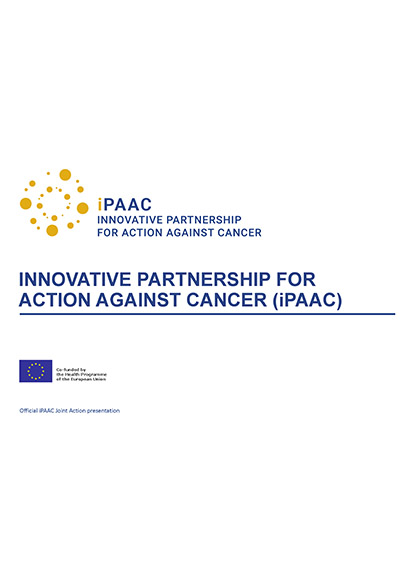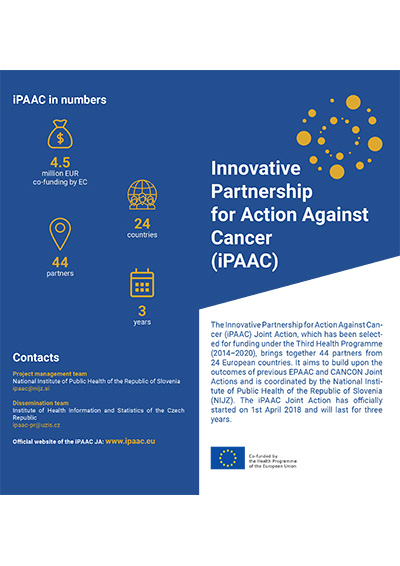Cancer continues to present one of the key public health challenges in the European Union. Over the last 8 years, we have seen an intensification of the activities at the level of the European Union in order to tackle cancer from different aspects. Still, a number of important outstanding issues in cancer control remain unaddressed. The Innovative Partnership for Action Against Cancer (iPAAC), which has been selected for funding under the Third Health Programme 2014–2020, aims to build upon the outcomes of previous EPAAC and CANCON Joint Actions.
The general objective of the iPAAC Joint Action (JA) is to develop innovative approaches to advances in cancer control. The innovation that will be covered within the JA consists of further development of cancer prevention, comprehensive approaches to the use of genomics in cancer control, cancer information and registries, improvements and challenges in cancer care, mapping of innovative cancer treatments and governance of integrated cancer control, including a new analysis of National Cancer Control Plans. The key focus of the Joint Action will be on implementation, reflected in the key deliverable: the Roadmap on Implementation and Sustainability of Cancer Control Actions, which will support Member States in implementation of iPAAC and CANCON recommendations. The Roadmap will act as the central pillar of the JA, integrating the diverse topic areas, ensuring consideration of transversal issues for all topics and acting as the central comprehensive deliverable, integrating all the JA outputs. A variety of methods will be used to fulfil the general and specific objectives of the iPAAC JA including pilot studies, working groups, expert panels, literature review and surveys. This Joint Action aims to add value at the EU level by enhancing collaboration in the field of cancer with extensive exchange of good practices, successful implementation of different programmes and gradual reduction of the cancer burden in Europe and the world.
The primary target group of the iPAAC Joint Action will be EU-level policymakers and decision makers at national, regional and local level. All of the innovative actions covered by the JA Work Packages will be assessed on the basis of sustainability and integration into national policies. Policymakers at Member State level will play a pivotal role in the JA and will are formally included in the iPAAC Governmental Board, which will meet twice per year to discuss implementation of iPAAC and previous recommendations. Key stakeholders at EU level will meet annually in Brussels to discuss iPAAC developments and synergies in the iPAAC Stakeholder Forum. The first is provisionally set to take place in Brussels in the second half of September 2018.
A key added value of the iPAAC Joint Action will therefore be support for Member States in implementing recommendations from the iPAAC and CANCON JA at national, regional and local levels. Additionally, iPAAC will provide better efficacy for dealing with neglected cancers, through development of new key indicators to assess clinical patient pathways and health care related costs of cancer and its interventions, particularly in the case of pancreatic cancer.
The iPAAC Joint Action has officially started on 1 April 2018 and it will last for three years. It includes 44 partners (Competent Authorities and Affiliated Entities) from 24 European countries and will be coordinated by the National Institute of Public Health Slovenia (NIJZ). More information about the iPAAC Joint Action can be obtained by visiting the official website (www.ipaac.eu) or by contacting the coordination team (ipaac@nijz.si).
Prepared by Tit Albreht, Karmen Hribar and Tina Lipuscek, National Institute of Public Health Slovenia, May 2018

